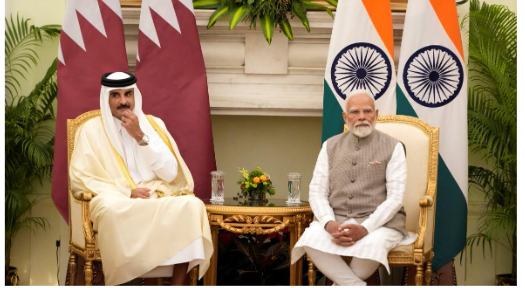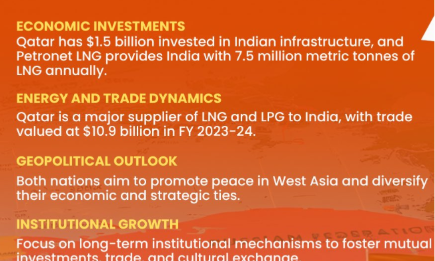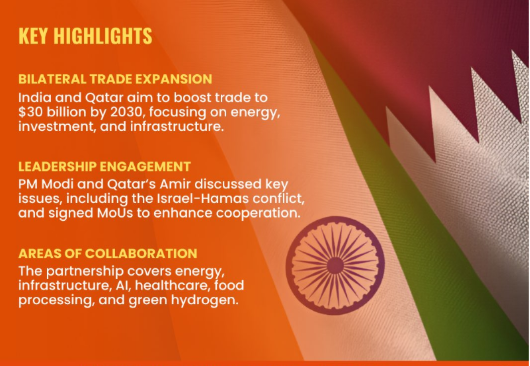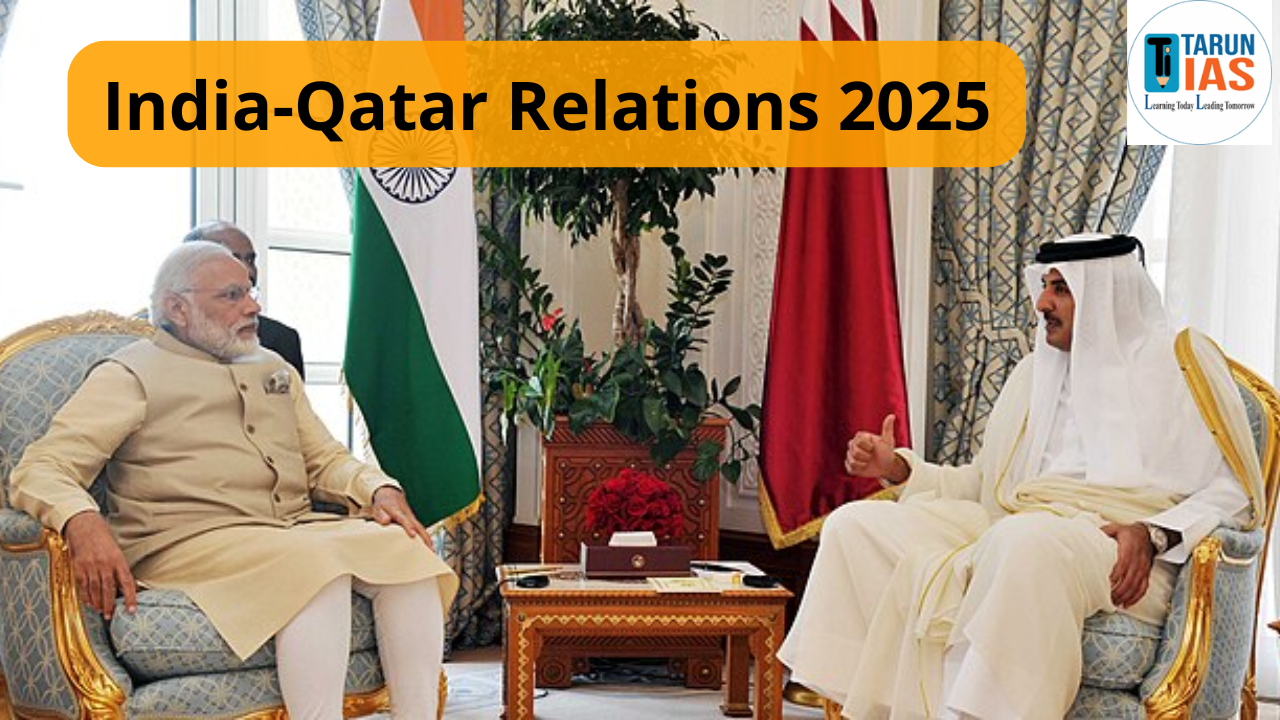India-Qatar Relations 2025 Introduction
- India and Qatar have cultivated a robust and strategic partnership that has become increasingly vital in recent years. From energy security to defense cooperation, economic growth to regional stability, the ties between the two countries are multifaceted and of immense significance.
- The February 2025 visit of Qatar’s Emir, Sheikh Tamim bin Hamad Al-Thani, to India further underscored their strengthened relationship, with a promise to boost trade, investment, and bilateral cooperation.

Key Highlights of India-Qatar Recent Agreement
-
- Trade Expansion: India and Qatar have set an ambitious target to double bilateral trade from $14 billion to $28 billion by 2030. They are working on exploring a Comprehensive Economic Partnership Agreement (CEPA) to unlock even greater trade potential. India’s main exports to Qatar include cereals, copper, iron, and steel, while Qatar sends LPG, chemicals, petrochemicals, and LNG to India. The increased trade flow aims to boost economic growth and open new opportunities for businesses in both nations.
- Financial and Economic Collaboration: India and Qatar have signed a Revised Double Taxation Avoidance Agreement, which is expected to strengthen business ties by eliminating barriers to cross-border transactions. Additionally, the operationalization of UPI at Qatar National Bank’s Points of Sale will improve financial connectivity, making financial transactions more seamless between the two nations. The expansion of Qatar National Bank (QNB) in India was welcomed, particularly through the establishment of an office in GIFT City.

- Investment Focus: Qatar has committed to investing $10 billion in India, particularly in infrastructure, technology, logistics, food security, and hospitality. This large-scale investment will create job opportunities and further cement India’s position as an attractive destination for foreign investment.

- Security and Counter-Terrorism Cooperation: India and Qatar have vowed to intensify collaboration on counter-terrorism efforts, including sharing intelligence and improving cybersecurity. Both countries have condemned cross-border terrorism, with a clear focus on safeguarding each other’s security interests. This partnership strengthens regional security, offering India more confidence in navigating the volatile geopolitical landscape of the Gulf.
- Regional and Global Cooperation: Both nations are committed to advocating for reforms in the United Nations, particularly supporting India’s bid for a permanent seat on the Security Council. Additionally, Qatar plays a vital role in facilitating the India-GCC strategic dialogue, making it a crucial partner in India’s broader regional and global diplomatic strategy.
Historical Evolution of India-Qatar Diplomatic Relations
- India and Qatar have a long history of diplomatic engagement. India was one of the first nations to recognize Qatar after its independence in 1971, and by 1973, the two countries established formal diplomatic relations.
- Fast forward to 2008, when Prime Minister Manmohan Singh’s visit to Qatar marked a significant shift towards stronger cooperation.
- Since then, high-level visits, including Prime Minister Narendra Modi’s visit to Qatar in 2016, and the Emir’s reciprocal visit to India in 2015, have played a pivotal role in shaping the trajectory of this bilateral relationship.
Strategic Importance of India-Qatar Relations
- Energy Security: Qatar is India’s largest supplier of Liquefied Natural Gas (LNG), with over 50% of India’s LNG needs sourced from the Gulf nation. As global energy markets become increasingly volatile, Qatar’s consistent supply of LNG is vital for India’s energy security. In 2022 alone, Qatar’s LNG exports to India were valued at over $7 billion, making the country an indispensable partner in ensuring energy security. To further boost assured supplies, Petronet LNG Ltd signed a long-term deal in February 2024 with Qatar Energy for supply of 7.5 million tonnes of LNG per annum starting from 2028 until 2048.
- Economic Interdependence and Trade Relations: Trade between India and Qatar has grown rapidly over the years, with India ranking as one of Qatar’s largest trade partners. India’s export to Qatar during the period was US$ 1.7 billion and India’s import from Qatar was US$ 12.38 billion. Qatar’s key exports to India include LNG, LPG, chemicals and petrochemicals, fertilisers etc while India’s key exports to Qatar include cereals, copper, iron and steel articles, vegetables, fruits, spices, processed food products, textiles & garments etc. In 2023, India was among the top three largest export destinations for Qatar (China and South Korea being the other two).
- Political Influence in the Gulf and Beyond: Qatar’s position as a key member of the Gulf Cooperation Council (GCC) gives it significant political clout. For India, Qatar’s support is crucial on various fronts, particularly with respect to regional stability and India’s push for a permanent seat at the United Nations Security Council. Qatar’s diplomatic influence can help India navigate complex geopolitical dynamics, such as the ongoing tensions in the Middle East and West Asia.
- Rising Investments: Qatar has significantly increased its investments in India, leveraging its $526 billion sovereign wealth fund managed by the Qatar Investment Authority (QIA). As the world’s eighth-largest sovereign fund, QIA plays a crucial role in supporting India’s economic growth, industrial modernization, and infrastructure development.
- Indian Business Presence in Qatar: Several major Indian companies have established a strong presence in Qatar, including L&T, Wipro, TCS, and Tech Mahindra. In January 2024, Qatar Energy awarded L&T a $1.3 billion EPC contract for the Al Shaheen field, boosting oil production by 100,000 barrels per day. Earlier, in August 2023, Qatar Investment Authority’s subsidiary INQ Holding LLC invested $1 billion in Reliance Retail Ventures and $474 million for a 2.7% stake in Adani Green Energy. In September 2023, QIA invested $150 million in Indospace, followed by $50 million in Global Dental Services (Clove Dental in India) in November 2023.
- Defense and Strategic Cooperation: India and Qatar have bolstered their defense and security ties through agreements such as the Defense Cooperation Agreement. Joint exercises, such as Exercise Zair-Al-Bahr, have enhanced maritime security cooperation. With both countries facing shared security challenges, their defense collaboration strengthens not only their bilateral relationship but also regional stability in the Gulf.
- Cultural Ties and People-to-People Engagement: The cultural relationship between India and Qatar is robust, with numerous events organized by the Indian Cultural Centre (ICC) and community organizations. Qatar has also been a strong supporter of India’s cultural initiatives, such as co-sponsoring the resolution at the United Nations to declare June 21 as International Yoga Day. This cultural engagement fosters greater understanding and cooperation between the peoples of both nations.
- Expatriate Community and Remittances: India has a large expatriate community in Qatar, with over 800,000 Indians living and working in the country. The remittance flow from Qatar to India amounts to around $750 million annually, a significant contribution to India’s economy. The safety and well-being of the Indian diaspora in Qatar is a key concern for India’s foreign policy, ensuring strong bilateral ties and continued economic cooperation.
Challenges in India-Qatar Relations
- Energy Dependence: India’s heavy dependence on Qatar for LNG imports poses a strategic challenge. Any disruption in LNG supplies due to geopolitical instability, price fluctuations, or changes in Qatar’s energy policies could have significant implications for India’s energy security. To mitigate this risk, India needs to diversify its energy sources and explore alternative markets.
- Regional Geopolitical Dynamics: India’s diplomatic efforts in the Gulf region are complicated by the ongoing tensions in the Middle East, including the Israel-Hamas conflict and the broader Gulf Cooperation Council dynamics. India must tread carefully to maintain good relations with both Qatar and other Gulf nations while balancing its relationships with global powers such as the United States and China.
- Trade Imbalance: India’s trade deficit with Qatar remains a concern, as Qatari exports, especially LNG and petrochemical products, continue to dominate the trade balance. This imbalance has led to discussions around how India can increase its exports to Qatar, particularly in sectors like technology, manufacturing, and agriculture. Efforts should focus on expanding non-energy exports to create a more balanced trade relationship.
- Anti-India Sentiment: Occasionally, certain Qatari media outlets and social media influencers have propagated narratives critical of India’s domestic policies, particularly those related to religious freedoms and human rights. This has led to diplomatic tensions that need to be addressed through consistent engagement, media diplomacy, and people-to-people interactions.
- Labor Rights and Diaspora Concerns: The Kafala labor system in Qatar has drawn criticism for its treatment of migrant workers, particularly those from India. This issue remains a point of contention in India-Qatar relations, requiring careful diplomatic management to ensure the safety and rights of the Indian expatriate community. Both governments need to engage in regular dialogue to address labor rights concerns and enhance protections for workers.
Way Forward
- Diversification of Economic Ties: India needs to reduce its dependence on LNG by expanding cooperation in sectors such as technology, fintech, and advanced manufacturing. This diversification will reduce vulnerabilities and create new growth avenues for both nations.
- Institutional Frameworks for Collaboration: Establishing joint business forums and formal investment treaties will create a stronger institutional framework for bilateral economic cooperation. These frameworks will provide a platform for addressing challenges in trade, investment, and security, ultimately benefiting both nations.
- Strategic Alignment: Both India and Qatar should continue to prioritize long-term cooperation in critical sectors such as energy, technology, and infrastructure. Expanding these areas will contribute to mutual growth and enhance their strategic positioning in global geopolitics.
- Regional Stability and Diplomacy: India should leverage Qatar’s diplomatic influence to resolve regional conflicts, particularly in Afghanistan and other parts of the Gulf. Qatar’s role as a mediator in these issues can help India strengthen its presence and influence in the region.















